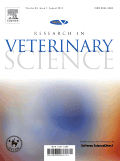
RESEARCH IN VETERINARY SCIENCE
Scope & Guideline
Transforming Animal Care Through Groundbreaking Studies
Introduction
Aims and Scopes
- Animal Health and Disease Management:
Research articles often focus on the epidemiology, diagnostics, and treatment of diseases affecting various animal species, including livestock and companion animals. - Veterinary Pharmacology and Therapeutics:
The journal publishes studies on pharmacokinetics, pharmacodynamics, and therapeutic efficacy of veterinary drugs, addressing both traditional and novel treatment approaches. - Nutrition and Metabolism:
A significant number of papers examine the nutritional needs and metabolic processes in various species, aiming to optimize feeding strategies for improved health and productivity. - Animal Welfare and Ethics:
Research in this area evaluates the impacts of different husbandry practices on animal welfare, emphasizing humane treatment and ethical considerations in veterinary practices. - Zoonotic Diseases and Public Health:
The journal contributes to understanding zoonotic diseases, highlighting the intersection of animal health and human health, particularly in the context of emerging infectious diseases. - Genetics and Reproductive Biology:
Papers often explore genetic factors influencing health, disease resistance, and reproductive success, utilizing advanced genomic technologies. - Innovative Diagnostic Techniques:
The journal features research on novel diagnostic methods, including molecular techniques and imaging technologies, aimed at enhancing disease detection and management.
Trending and Emerging
- Integrative Approaches to Animal Health:
There is a growing trend towards integrative veterinary medicine that combines traditional practices with holistic approaches, emphasizing the interconnectedness of animal health, environment, and human health. - Use of Artificial Intelligence and Machine Learning:
Emerging themes include the application of AI and machine learning in diagnostics, treatment planning, and veterinary education, showcasing the integration of technology in veterinary practices. - Microbiome Research:
Research focusing on the microbiome's role in animal health, nutrition, and disease resistance is gaining prominence, highlighting the importance of gut health in overall well-being. - One Health Approach:
The One Health concept, acknowledging the link between animal health, human health, and environmental health, is increasingly reflected in the journal's publications. - Sustainability in Veterinary Practices:
There is an emerging focus on sustainability, with studies addressing sustainable practices in animal husbandry, nutrition, and disease management to mitigate environmental impacts. - Veterinary Mental Health:
Research on the mental health of veterinary professionals is gaining attention, recognizing the importance of psychological well-being in providing quality animal care.
Declining or Waning
- Traditional Veterinary Practices:
There has been a noticeable decrease in the publication of studies related to conventional veterinary practices, possibly as focus shifts towards more innovative and integrative approaches. - Invasive Surgical Techniques:
Research on invasive surgical techniques is less prominent, potentially due to advancements in minimally invasive procedures and non-surgical interventions. - Basic Animal Behavior Studies:
There is a waning interest in basic behavioral studies, as more research is directed towards applied behavior and its implications for welfare and training. - Non-Pharmaceutical Interventions:
The exploration of non-pharmaceutical interventions in veterinary medicine has decreased, as the field increasingly emphasizes pharmacological solutions and biotechnological advancements. - Single Species Focus:
Research centered exclusively on single species is declining, with a trend towards multi-species studies that consider broader ecological and health contexts.
Similar Journals
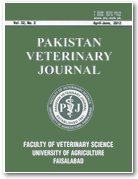
PAKISTAN VETERINARY JOURNAL
Advancing veterinary science for a healthier future.Pakistan Veterinary Journal (ISSN: 0253-8318, E-ISSN: 2074-7764) is a leading peer-reviewed academic journal published by the University of Agriculture, Faculty of Veterinary Science, situated in Faisalabad, Pakistan. Since its inception, the journal has embraced an Open Access policy, facilitating the dissemination of vital research findings to a global audience and enhancing the visibility of veterinary science. With an impressive Q1 ranking in the veterinary miscellaneous category, the journal ranks #27 out of 194 in the veterinary general field according to Scopus, placing it in the top 14% of the discipline. The scope of the journal encompasses a wide array of topics relevant to veterinary medicine, ensuring that it serves as an essential resource for researchers, professionals, and students alike. By providing a platform for high-quality research from 2009 to 2024, the Pakistan Veterinary Journal continues to play a pivotal role in advancing veterinary science, promoting collaboration among scholars, and addressing contemporary challenges in animal health and welfare.
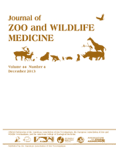
JOURNAL OF ZOO AND WILDLIFE MEDICINE
Exploring innovative solutions in zoo and wildlife medicine.JOURNAL OF ZOO AND WILDLIFE MEDICINE, published by the American Association of Zoo Veterinarians, serves as a pivotal resource in the field of veterinary science, focusing specifically on the health and well-being of zoo and wildlife species. With an ISSN of 1042-7260 and an E-ISSN of 1937-2825, this journal is recognized for its significant contributions to animal science and has been categorized in the second quartile in both Animal Science and Zoology, as well as Veterinary disciplines, according to the latest rankings. It holds a respectable position within Scopus, being ranked #91 in General Veterinary and #290 in Animal Science and Zoology. While the journal operates on a subscription basis, its impactful research articles have been invaluable for clinicians, researchers, and students alike, providing crucial insights that advance wildlife conservation, veterinary practices, and animal health care from 1993 to the present. With a global reach and a targeted focus on both theoretical and practical applications, JOURNAL OF ZOO AND WILDLIFE MEDICINE is instrumental in fostering collaboration among professionals dedicated to the study and care of wild animal populations.

Iranian Journal of Veterinary Research
Exploring New Frontiers in Veterinary MedicineWelcome to the Iranian Journal of Veterinary Research (IJVR), a prestigious platform dedicated to advancing the field of veterinary science. Published by Shiraz University, this journal plays a pivotal role in disseminating high-quality research findings amid a vibrant academic community. With its ISSN 1728-1997, and a convergence of studies from 2008 to 2024, IJVR serves as an essential resource for veterinarians, researchers, and students interested in Animal Science and Zoology. Recognized in the Q3 quartile for both Animal Science and Veterinary categories, it holds a respectable position with Scopus rankings placing it in the 54th percentile among general veterinary journals. Although it currently lacks an open access model, the journal ensures that cutting-edge veterinary research is presented with rigor and relevance, fostering knowledge that contributes to animal health and welfare. With its strategic focus on innovative methodologies, clinical practices, and the biological sciences, the IJVR is set to become your go-to source for critical advancements in veterinary research.
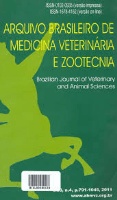
ARQUIVO BRASILEIRO DE MEDICINA VETERINARIA E ZOOTECNIA
Championing excellence in veterinary research and education.ARQUIVO BRASILEIRO DE MEDICINA VETERINARIA E ZOOTECNIA, an esteemed publication in the field of veterinary medicine and animal science, has been a vital resource for researchers and professionals since its inception in 1996. Published by the ARQUIVO BRASILEIRO MEDICINA VETERINARIA ZOOTECNIA, this journal is recognized for its open-access model, allowing widespread dissemination of knowledge since 1999. With a 2023 Scopus ranking placing it in the 25th percentile within the veterinary field, ARQUIVO BRASILEIRO is categorized in Q3 in Veterinary (miscellaneous), highlighting its commitment to scholarly excellence. The journal's scope encompasses a diverse range of topics related to veterinary medicine and zootechnics, making it a crucial platform for advancing research and professional practice. Situated in Belo Horizonte, Minas Gerais, Brazil, it serves not only the local community but also an international audience, fostering collaboration and innovation in veterinary sciences. As such, ARQUIVO BRASILEIRO is an invaluable asset for students, researchers, and practitioners looking to stay at the forefront of veterinary research.
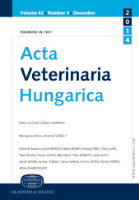
ACTA VETERINARIA HUNGARICA
Pioneering insights for the global veterinary community.ACTA VETERINARIA HUNGARICA is a prestigious academic journal published by AKADEMIAI KIADO ZRT, dedicated to the diverse field of veterinary science. With a history spanning over three decades since its inception in 1983, this journal provides a platform for the dissemination of high-quality research, clinical studies, and reviews that contribute to advancing knowledge in veterinary medicine and animal health. Based in Hungary, it has built a respectable reputation, reflected in its Scopus ranking, where it occupies the 84th position out of 194 in the General Veterinary category, placing it within the 56th percentile. Although the journal is not open access, it continues to attract a global audience of researchers, professionals, and students who are keen on exploring advancements in veterinary science as it converges towards its upcoming year of 2024. Readers will find valuable insights that foster innovation and improve animal care practices across various settings, making ACTA VETERINARIA HUNGARICA an essential resource for anyone involved in the veterinary field.

Journal of Veterinary Research
Transforming animal health with groundbreaking research.The Journal of Veterinary Research, published by SCIENDO, is a leading open-access journal dedicated to advancing the field of veterinary science. Established in Poland and accessible globally since 2012, this journal serves as a pivotal platform for researchers, professionals, and students, promoting the dissemination of high-quality research and innovative findings in veterinary medicine. With a robust impact factor reflective of its Q2 ranking in the Veterinary (miscellaneous) category for 2023, it ranks 54th out of 194 in the general veterinary field, placing it in the 72nd percentile among its peers. The Journal of Veterinary Research explores a wide variety of topics pertinent to veterinary practice, animal health, and research methodologies, making it an essential resource for academics and practitioners alike. Authors benefit from the journal's open-access model, which ensures their research is freely available to a broader audience, thus fostering collaboration and innovation within the veterinary community.

ISRAEL JOURNAL OF VETERINARY MEDICINE
Cultivating Insights for a Brighter Future in Animal HealthThe Israel Journal of Veterinary Medicine, published by the Israel Veterinary Medical Association, serves as a vital resource for researchers, professionals, and students in the fields of veterinary medicine and animal science. With a commitment to advancing knowledge across diverse veterinary disciplines, this journal plays a crucial role in disseminating significant findings and innovations that influence both local and global veterinary practices. Although it currently holds a Q4 ranking in both the Animal Science and Zoology and Veterinary (miscellaneous) categories, the journal's open access policy, enabling free availability of articles, aspires to increase its accessibility and engagement among the academic community. The journal's convergence of research from 2007 to 2024 showcases its dedication to continuously contributing to the evolving landscape of veterinary science.

BERLINER UND MUNCHENER TIERARZTLICHE WOCHENSCHRIFT
Pioneering Research for a Healthier Animal WorldBERLINER UND MUNCHENER TIERARZTLICHE WOCHENSCHRIFT is an esteemed journal in the fields of Veterinary Science and Medicine, published by SCHLUETERSCHE VERLAGSGESELLSCHAFT MBH & CO KG. Since its inception in 1946, this journal has served as a vital platform for advancing knowledge and research in veterinary medicine within Germany and beyond. With a current impact factor that places it in the Q4 category in both Medicine and Veterinary, it continues to provide significant insights for professionals, researchers, and students engaged in the veterinary community. Although it is not an Open Access journal, its rich content contributes to the foundational literature of the field, making it an essential reference. Researchers looking to publish their findings or keep informed on the latest advancements in veterinary and medical practices will find this journal an invaluable resource. It is headquartered in Hannover, Germany, and serves as a testament to the ongoing dedication to veterinary research since the mid-20th century.

Frontiers in Veterinary Science
Unlocking insights for the future of animal care.Frontiers in Veterinary Science is a premier open-access journal dedicated to the latest advancements and research in the field of veterinary science. Published by FRONTIERS MEDIA SA in Switzerland, the journal has been at the forefront of disseminating high-quality research since its establishment in 2014. With an impressive rank of #15 out of 194 in the general veterinary category and a high percentile of 92nd in Scopus rankings, it is recognized as a leading publication in veterinary medicine and related disciplines, maintaining a prominent Q1 quartile status as of 2023. The journal promotes the wide dissemination of knowledge through its open-access policy, ensuring that researchers, professionals, and students have unrestricted access to critical findings and innovations in veterinary science. Nestled in the vibrant academic landscape of Lausanne, Switzerland, Frontiers in Veterinary Science is not just a journal; it is a vital resource for advancing veterinary practices and improving animal health globally.
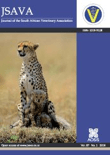
Journal of the South African Veterinary Association
Advancing Veterinary Science Through Open AccessJournal of the South African Veterinary Association is a prominent Open Access journal dedicated to advancing the field of veterinary science since its inception in 1945. Published by MEDPHARM PUBLICATIONS PTY LTD, this journal stands out with an impactful HIndex and a commendable categorization in 2023, ranking Q3 in Medicine (miscellaneous) and Q2 in Veterinary (miscellaneous). With a Scopus rank of 96 out of 194 in the veterinary field, it serves as an essential resource for researchers, veterinary professionals, and students, promoting the dissemination of high-quality research and knowledge. The journal offers a platform for peer-reviewed articles covering diverse topics relevant to veterinary and animal health issues, encouraging expansive dialogue and collaboration within the academic community. Based in Centurion, South Africa, and accessible globally since it adopted an Open Access model in 1997, the journal exemplifies a commitment to accessibility and the sharing of knowledge.